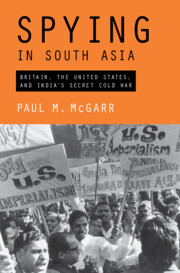Book contents
- Spying in South Asia
- Spying in South Asia
- Copyright page
- Contents
- Figures
- Acknowledgements
- A Note on Place Names
- Abbreviations
- Introduction
- 1 Transfer of Power: British Intelligence and the End of Empire in South Asia
- 2 Silent Partners: Britain, India, and Early Cold War Intelligence Liaison
- 3 India’s Rasputin: V. K. Krishna Menon and the Spectre of Indian Communism
- 4 Quiet Americans: The CIA and the Onset of the Cold War in South Asia
- 5 Confronting China: The Sino-Indian War and Collaborative Covert Action
- 6 Peddling Propaganda: The Information Research Department and India
- 7 From Russia with Love: Dissidents and Defectors in Cold War India
- 8 The Foreign Hand: Indira Gandhi and the Politics of Intelligence
- 9 Battle of the Books: Daniel Patrick Moynihan, Seymour Hersh, and India’s CIA ‘Agents’
- 10 Indian Intelligence and the End of the Cold War
- Conclusion
- Notes
- Bibliography
- Index
Conclusion
Published online by Cambridge University Press: 12 September 2024
- Spying in South Asia
- Spying in South Asia
- Copyright page
- Contents
- Figures
- Acknowledgements
- A Note on Place Names
- Abbreviations
- Introduction
- 1 Transfer of Power: British Intelligence and the End of Empire in South Asia
- 2 Silent Partners: Britain, India, and Early Cold War Intelligence Liaison
- 3 India’s Rasputin: V. K. Krishna Menon and the Spectre of Indian Communism
- 4 Quiet Americans: The CIA and the Onset of the Cold War in South Asia
- 5 Confronting China: The Sino-Indian War and Collaborative Covert Action
- 6 Peddling Propaganda: The Information Research Department and India
- 7 From Russia with Love: Dissidents and Defectors in Cold War India
- 8 The Foreign Hand: Indira Gandhi and the Politics of Intelligence
- 9 Battle of the Books: Daniel Patrick Moynihan, Seymour Hersh, and India’s CIA ‘Agents’
- 10 Indian Intelligence and the End of the Cold War
- Conclusion
- Notes
- Bibliography
- Index
Summary
Spying in South Asia’s conclusion addresses the impact of the end of the Cold War, and the onset of a ‘war on terror’, on British and American intelligence relationships with India. It explores the rationale behind Indian governments’ softening of anti-CIA rhetoric from the mid-1980s, and the implications for New Delhi’s intelligence agencies of the precipitous collapse of the USSR, and the abrupt conclusion of the Cold War. It assesses factors underlying the post-Cold War recovery of Western secret services from the position of public pariahs in India to that of New Delhi’s principal partners in intelligence and security matters. In 1947, as the Cold War dawned and the newly independent subcontinent confronted formidable threats to its stability and security, New Delhi turned to London and Washington for covert support. Some half-a-century later, after decades of what might best be described as circumscribed cooperation compromised by conflict and conspiracism, the intelligence services of India, the United Kingdom, and the United States, once more found compelling reasons to put their differences aside, and work together as close partners in a new secret war.
- Type
- Chapter
- Information
- Spying in South AsiaBritain, the United States, and India's Secret Cold War, pp. 257 - 266Publisher: Cambridge University PressPrint publication year: 2024

